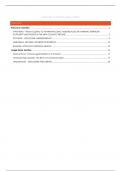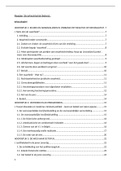Class notes
Anthropological Jurisprudence- Lecture notes
- Course
- Jurisprudence (PVL3006S)
- Institution
- University Of Cape Town (UCT)
First- Looking at the jurisprudence of the Earth. Discussing and analysing how law and legal systems can be found through studying the earth and its ecosystems. Almost like a geological study of Law. Thereafter looking at the development of the constitution, and discussing whether the constitut...
[Show more]





